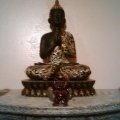Pragmatic Buddhism
 Jeroen
Not all those who wander are lostNetherlands Veteran
Jeroen
Not all those who wander are lostNetherlands Veteran
I came across this, it seems to be quite a small stream of dharma but it has its charm.
http://www.pragmaticbuddhism.org/
From one of the teachers’ blogs:
In conversation a few weeks ago, the comment was made to me, "I don't understand the whole Pragmatic Buddhism thing." What followed was a well-intended discussion about the necessity of a synthesis of Eastern and Western thought, and what you would lose by doing so. "They're just too messy," I was told. And I get that...to a point.
Siddhartha Gotama's world was far different than ours, and much of his teachings were a response to the culture and beliefs of the times. He believed that the "norm" was no longer relevant. People were losing something by clinging too hard to traditions and beliefs, and (while they certainly have their place) a lot of unnecessary suffering was occurring by doing so. He taught that everything is impermanent. Things change, people change, and culture and tradition change. By clinging to the idea of something permanent, we hurt ourselves, over and over again. Nothing lasts forever.
Fast forward to the modern world: a world of constant motion. We have grown in many ways, but many of the personal struggles the Buddha was dealing with still exist. The times (culture, tradition) have changed. The personal element has not. We watch everything constantly rise and fall around us, but we exclude ourselves from the equation. We want to live forever, often focusing on what comes after instead of what is here and now.
Pragmatic Buddhism takes real time (and scientifically) tested practices and applies them to the modern age. This is done by understanding that we live in a kind of grey area between black and white. Everything is interconnected, and often the good can have negative effects. Pragmatism tries to resolve this issue by looking at the whole picture, including the good and the bad, and trying to make the best decision possible. Not only for ourselves but for everyone.
So while PB honors the traditions and lineages it comes from, it also strives to move forward as a meaningful, honest way to help an ever-changing world. No longer bound by the idea of removing ourselves from the world, every day life is our monastery. Everyone is our brother or sister as we work together to make the world a better place. So in Pragmatic Buddhism there is nothing to "get." It is a way of life, and a way of experiencing the Dharma in action. With nothing to lose (or nothing to gain), that is our goal.





Comments
Sounds like Engaged Buddhism.
The more the merrier I say.
You know I think that all Buddhadharma at base is pragmatic or it’s not Buddhadharma. But whisper that quietly in some places..some people think it’s a philosophy in competition with other philosophies...😉
It sounds interesting. The pragmatic side is appealing to me, the real world is messy, holding to ideals can lead to worse outcomes.
This is why opinions, beliefs etc are faulty.
Once one is formed, it's as if you're trying to freeze time because the universe changes completely in the next moment.
Tee hee @Bunks
I believe in the unformed form ... I iz the fault in the system? Tsk tsk.
No plan. Iz plan!?
I think that is certainly the Buddhist teacher’s view, but a realist would say that some schools are more pragmatic than others.
Sounds like Buddhism. But Buddhism is about the actual specific practices that both develop our awareness in the moment, and that change our patterns of responding. Buddhism is nothing without the practices.
Life is tough. Deal with it. Iz plan ...
https://www.lionsroar.com/life-is-tough-six-ways-to-deal-with-it-march-2013/
If Buddhism had a form, it would be a lighthouse.
@federica I definitively agree. The best piece of evidence so far -personally- is what happens when the lighthouse (meditation practice and moral guidance) is turned off. It is a return to chaos. To put it lightly.
The advantage is that once you've seen the lighthouse, it is a bit easier to put it back to work.
It's also imperturbable. No matter what's going on around it, it's solid, reliable, constant and illuminating.
You mean to say... it’s... permanent?! :shockhorror:
checks post...nope... never said anything about 'permanent'....
Oh it’s just the mind being fooled by these other attributes of what we usually think of as permanent then...
if you think of them as permanent, then that is your mistake, not mine. I never had any intention of communicating any form of permanence....
I'm not sure of that. I have yet to see a stream of Buddhism that is not practical. Buddha was very practical as is the Eightfold Path. Any dharma that speaks to the development of skillful means is pragmatic whether it is focused on transforming the individual or the whole of society.
As an extremist, I am using yoga to sit without a cushion, gods, buddhas, chair or timing device.

Dharma Lite is one house/room of dharma. One becomes a picture of ones own making or enters a construction/plan/template of our own affinity.
The Tao is a form of manifest chaos. A light without ... or rather within.
Personal evidence/experience/faith is our first housing. We become the result of our practice.